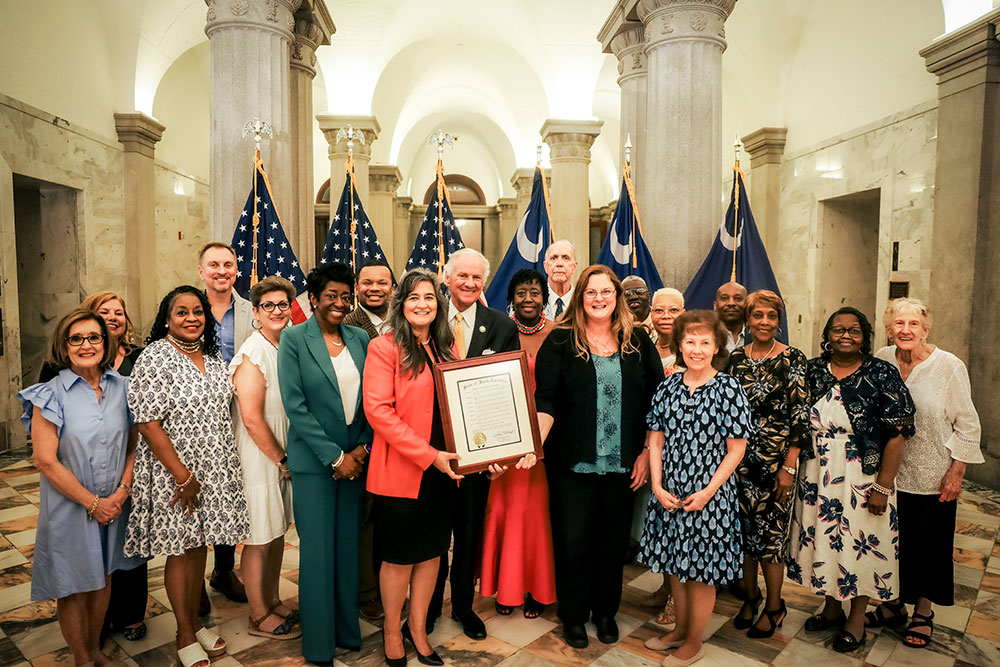Gov. McMaster Proclaims Foster Care Review Week in South Carolina
State Leaders Share Impact of Advocacy for Children in Foster Care

COLUMBIA, S.C. — Gov. Henry McMaster declared July 8-12, 2024, as Foster Care Review Week in a ceremony held Thursday, July 11 at the State House in recognition of the 50th anniversary of the founding of the Foster Care Review Board and the Foster Care Review Division.
Before reading the proclamation, McMaster shared how the character and culture of the people of South Carolina continues to attract more families and businesses to relocate to the Palmetto State. In order to keep our state healthy and prosperous, we need to keep our children healthy and prosperous, and that’s where the Foster Care Review Board comes in, lifting up and advocating for the best outcomes for children in foster care.
“I want to add my thanks to those who are doing this beautiful work,” said McMaster. “I know we are opening a lot of doors with what you are doing.”
Also speaking at the event were Amanda Whittle, South Carolina’s state child advocate and director of the Department of Children’s Advocacy, Lindsey Taylor, director of the FCRD, and Andrea McCoy, chair of the state board of the FCRB.
The FCRB and FCRD were created in July 1974 to provide external accountability to the foster care system, advocating for children and helping them find permanent homes through reunification with parents, guardianship with other family members, or adoption.
During the 2023 fiscal year, the FCRB evaluated the cases of 3,233 children who have been in foster care for at least four consecutive months and every six months thereafter. They review what efforts have been made to help those children achieve permanency and make recommendations to family courts regarding any barriers preventing children from permanency.
“The length of time a child spends in foster care, even more than their age, affects how long they will continue to remain in foster care without permanency, and extended time without permanency increases trauma and adverse childhood experiences,” said Whittle. “South Carolina laws pertaining to timely hearings are grounded in data and research regarding the points in time when a child's permanency trajectory changes significantly. Advocating for permanency is essential to improving outcomes for children in foster care.”
Minimizing a child’s stay in in foster care is possible through the many volunteers who serve on the 43 local review boards and a state board of directors, and give their valuable time to do this important work.
“In the last 50 years, board members have dedicated themselves to this task, and selflessly given countless hours of service identifying circumstances resulting in permanency delays and advocating for the actions necessary to remedy them,” said Taylor. When I look back at past data, our board members averaged at least 10,000 hours of service each year, and some of the years were over 15,000 hours. That is significant.”
The FCRD, a division of the South Carolina Department of Children’s Advocacy, works behind the scenes providing administrative and programmatic support to the 43 local Foster Care Review Boards by gathering and distributing relevant data and reports for each case, organizing and arranging review meetings, and ensuring all necessary parties are aware and able to attend. Attendees include Department of Social Services case managers, guardians ad litem, parents, family members, and others who may be involved in the child’s life.
There is more work to be done, says Taylor, but she believes recent advancements will improve the FCRD and FCRB’s abilities to effect change not only for individual children but for the system as a whole.
“Fifty years of service is remarkable, but, to me, just as exciting, is the prospect of the next 50 years,” she said. “Due to a number of factors… we are faced with an opportunity to continue the great work that has been ongoing for five decades while also growing our impact through enhancing our knowledge and understanding of how to get the best outcomes for children and families, increased accessibility thanks to technology avenues that weren’t previously available, and a robust partnership with DSS to support changes that they have very thoughtfully and intentionally made to strengthen the families that they serve. All of this adds up to an improved foster care system and better outcomes for children, which is why we’re all here.
McCoy, chair for the state board of directors of the FCRB, encouraged her fellow citizens to get involved by joining a local board.
“The journey doesn’t stop here, especially for those of us that serve. There is still so much more to do. But we need your support across the state,” she said. “If you’re interested in serving on a local review board, please visit the South Carolina Foster Care Review Board’s website where you can apply through your local county delegation. This is an excellent opportunity to contribute to your community as well as make a meaningful impact in the lives of children in foster care.”
To learn more about how to become a Foster Care Review Board member, visit fcrd.sc.gov. To make a report of neglect or abuse of a child in South Carolina, please call 1-888-CARE4US or visit dss.sc.gov to submit non-emergency reports through the online portal.
About the S.C. Department of Children’ Advocacy
The Department of Children’s Advocacy’s mission is to champion advocacy, accountability and service to improve outcomes for children served by state agencies in South Carolina. For more information, visit childadvocate.sc.gov.